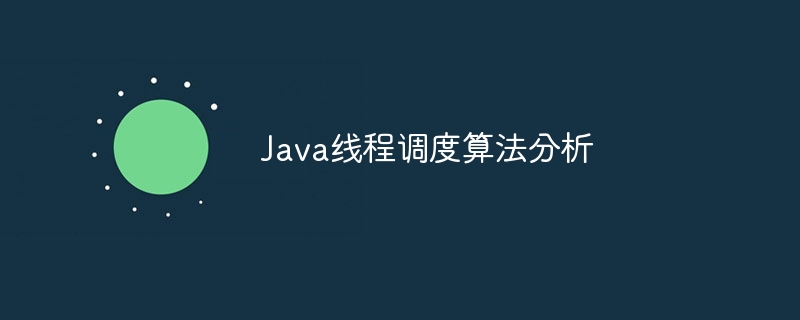Home >Java >javaTutorial >Analysis of Java Thread Scheduling Algorithm
Analysis of Java Thread Scheduling Algorithm
- 王林Original
- 2024-04-12 08:30:021085browse
Java uses two thread scheduling algorithms: CFS (Completely Fair Scheduler) and the traditional scheduler. CFS priority preemptive scheduling allocates CPU time based on fair shares to ensure fairness. Traditional schedulers are based on priority, with higher priority threads getting more CPU time.

Java thread scheduling algorithm analysis
Introduction
Thread scheduling algorithm determines How to allocate CPU time in a multi-threaded environment. Java uses a priority-based preemptive scheduling algorithm, which means that low-priority threads can interrupt high-priority threads.
Scheduling Algorithms
There are two main scheduling algorithms in Java:
- CFS (Completely Fair Scheduler): The default scheduler used in modern Java versions. It is based on the "fair share" concept, which allocates each thread a budget of running time, and after that budget is exhausted, it is paused to allow other threads to run.
- Legacy Scheduler: For older Java versions. It is based on priority, where threads with higher priority get more CPU time.
Thread priority
Thread priority is an integer between 1 and 10 (where 1 is the lowest and 10 is the highest). By default, threads have priority 5. It is possible to set thread priority explicitly, but this is generally not recommended.
Practical case
Suppose we have two threads, thread A and thread B. Thread A has a higher priority (8), while Thread B has a lower priority (2).
- CFS Scheduler: Even if Thread A has a higher priority, Thread B can exhaust its "fair share" " Previously interrupted thread A. This ensures that all threads get fair access to CPU time.
- Traditional Scheduler: Thread A will get more CPU time than Thread B because it has higher priority. Thread B may have to wait for Thread A to complete before it gets any CPU time.
Conclusion
Java's thread scheduling algorithm is designed to balance fairness, performance, and latency. The CFS scheduler is usually the best choice because it ensures that all threads get fair access to CPU time while avoiding starvation.
The above is the detailed content of Analysis of Java Thread Scheduling Algorithm. For more information, please follow other related articles on the PHP Chinese website!

